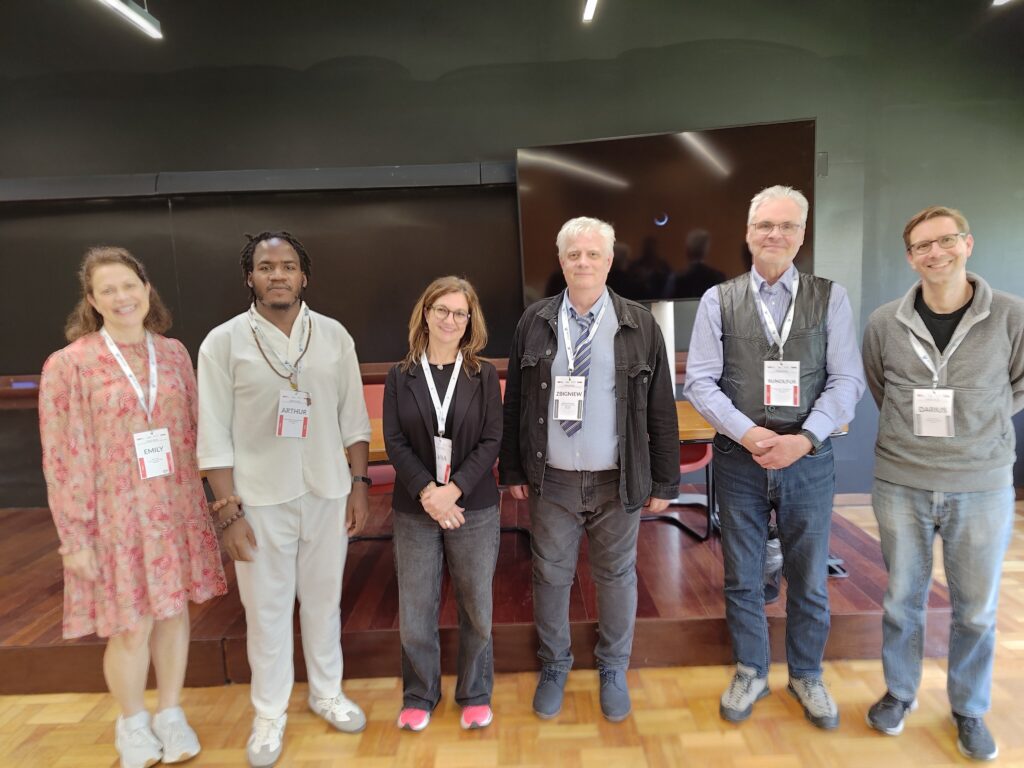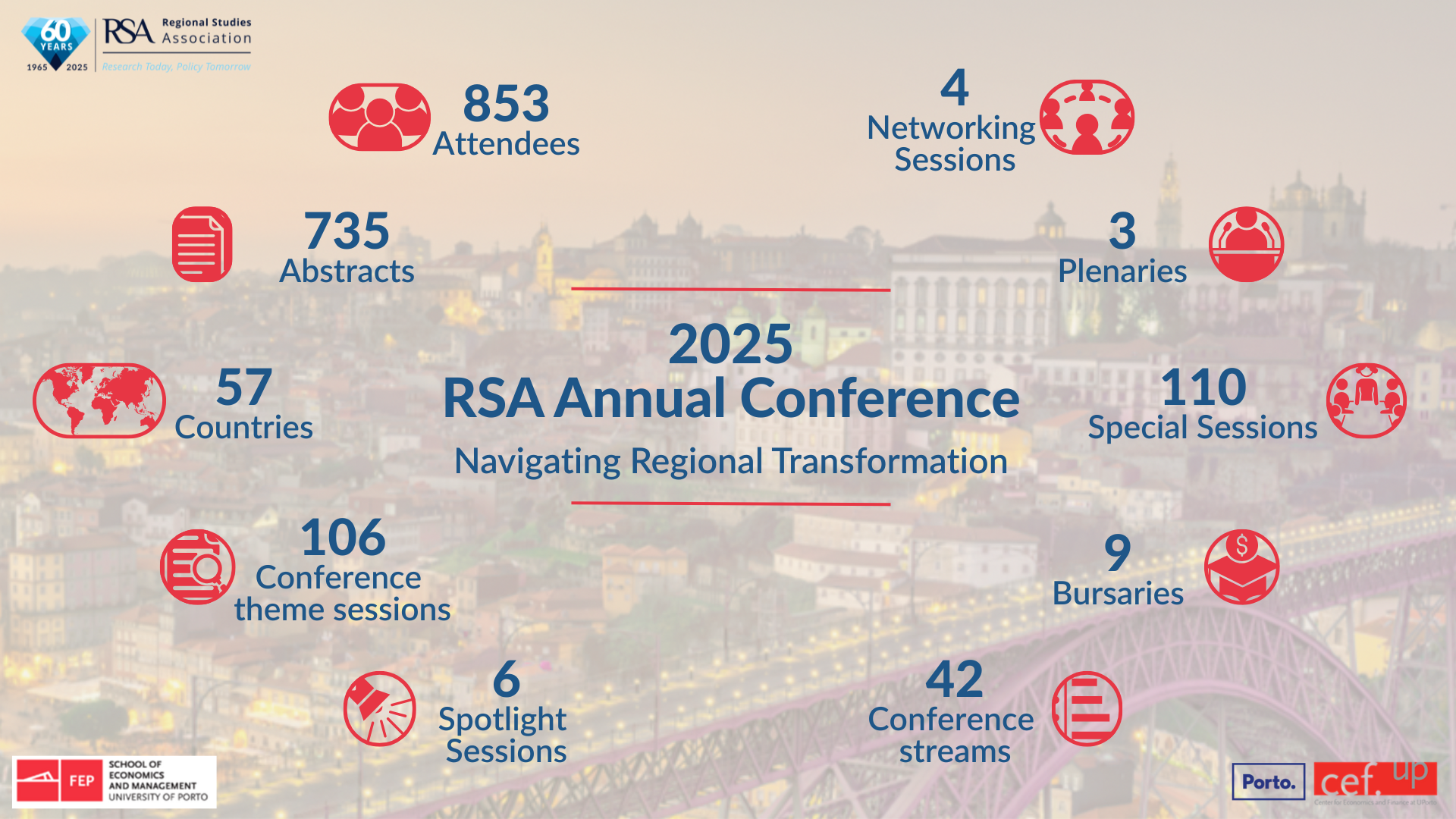RSA Events – Event Report – RSA Annual Conference, Entrepreneurship and Entrepreneurial Ecosystems II

RSA Events – Event Report – RSA Annual Conference, Entrepreneurship and Entrepreneurial Ecosystems II
2025 RSA Annual Conference
Navigating Regional Transformation
University of Porto, Portugal
6 May 2025 – 9 May 2025

Report on Entrepreneurship and Entrepreneurial Ecosystems II
By Louis-Caleb Remanda (email), Head of Economy, Market & Societies Department & Assistant Professor of Strategy & Management – ISG International Business School, France.
This year’s RSA Annual Conference, hosted by the University of Porto, brought together researchers from around the world to reflect on the key theme of “Navigating Regional Transformation.“ Among the many topics discussed, entrepreneurship and entrepreneurial ecosystems stood out as a recurring theme in understanding how regions can adapt, transform, and thrive in today’s challenging environments.
Across two key sessions, researchers showcased how entrepreneurship is not just about individual business success but about building interconnected environments—called entrepreneurial ecosystems—that foster innovation, resilience, and local development. Despite working with very different regions and sectors, all presenters agreed on one thing: ecosystems matter because they bring people, institutions, and resources together in ways that drive real impact on the ground.
In the first session, we saw a range of geographical perspectives. From Iceland, Steinthorsson & Ottósson showed how entrepreneurial support organizations—like incubators and clusters—help build entrepreneurship in a small economy. Their research drew on the Triple Helix theory, which emphasises the importance of collaboration among universities, businesses, and governments. By comparing four key organizations in Iceland, they demonstrated how ecosystems can evolve to meet local needs, especially after economic crises.
From Poland, Grzymała & Wójcik-Czerniawska shifted the conversation towards sustainability, using the circular economy as their main framework. They argued that entrepreneurial ecosystems are crucial in helping companies adopt greener business models, like renting products instead of selling them or turning waste into new resources. Their examples highlighted how ecosystems can make sustainability profitable, not just ethically.
Moving to Canada, Ornston & Southin introduced the idea of associational governance. They studied how local entrepreneur networks like Communitech, and the Council of Canadian Innovators (CCI) can offer support and advice, especially for startups. However, their research revealed that these local networks often struggle to help businesses grow beyond the startup phase, highlighting the need for stronger national support systems.
Two studies from Africa focused on different challenges. First, Sedita and colleagues studied sectors like argan oil, leather tanning, and coffee across Morocco, Egypt, and Ethiopia. Using the Stam entrepreneurial ecosystem model, they demonstrated how different sectors and countries foster entrepreneurship in distinct ways, particularly concerning the availability of institutions and infrastructure. Fodouop Kouam focused on Central Africa, utilising resilience theory to explain how, in fragile environments such as Cameroon or the DRC, informal networks and local knowledge are crucial in helping entrepreneurs navigate multiple crises.
The second session focused more on rural areas—often overlooked in entrepreneurship research. Bowen compared rural SMEs in Wales and New Zealand, using the concept of resource bricolage—essentially demonstrating how rural businesses survive by creatively utilising the resources available to them. His findings stressed that, even in isolated areas, local networks and multi-activity businesses can create resilience.
On a more positive note, Müller examined rural coworking spaces in Germany. Her study showed that these shared working environments not only provide office space but also foster collaboration, creativity, and professional networking in rural regions. Coworking spaces, she argued, are becoming a tool for revitalizing rural areas and making them more attractive for professionals.
Taken together, these ongoing papers enriched the understanding of entrepreneurial ecosystems as multi-level, adaptive systems that are profoundly shaped by local resources, institutional contexts, and socio-cultural norms. And while some ecosystems are geared towards overcoming crises and fostering resilience (in Africa), others serve as platforms for sustainability transitions or rural regeneration (Europe & America). But most importantly, these sessions highlighted how entrepreneurship operates not just as an economic function but as a socially embedded process that shapes local resilience, sustainability, and innovation pathways. This shows why entrepreneurship matters—not just for starting companies, but for building better futures for regions around the world.

Complementary reading
RSA Events – Event Report – RSA Annual Conference, Inclusive Growth, Housing, and Well-Being
RSA Events – Event Report – RSA Annual Conference, Entrepreneurship and Entrepreneurial Ecosystems
Conference Statistics

The Regional Studies Association’s Annual Conference 2025 #RSA25 was held in partnership with the School of Economics and Management at the University of Porto, Portugal. This four-day conference brought together academics and policymakers to exchange news, views, and research findings from regional studies and science, as well as regional and economic development, policy, and planning. There was representation from 57 different global territories as we gathered established experts and early career researchers in the beautiful city of Porto.
The conference featured 750+ presentations, high-profile plenary speakers, several specially convened sessions, workshops, professional development and networking sessions, walking tours and field trips. The social programme included the conference dinner and a reception, as well as side events, exhibitor stalls, and post-conference tours to explore Porto.